Travis Fisher and Gabriella Beaumont-Smith
The long‐awaited text of Senator Bill Cassidy’s (R‑LA) legislation to impose a tax on imports based on “pollution intensity” was released on November 3. Fisher’s previous piece highlighted how Senator Cassidy’s concept of a “foreign pollution fee” is 1) a carbon tax on imports, 2) will hurt American consumers, and 3) lays the groundwork for a domestic carbon tax. Unfortunately, those facts remain upon inspection of the bill.
Senator Lindsey Graham (R‑SC) is a sponsor of the bill but Senator Roger Wicker (R‑MS), the other original co‐sponsor of the legislation, withdrew his endorsement.
We’ve read the 92 pages of the Foreign Pollution Fee Act of 2023 (hereinafter referred to as the Cassidy Carbon Tax) so our audience doesn’t have to. There are several areas of grave concern, much of which relate to provisions in the bill that were not apparent in Senator Cassidy’s Foreign Affairs article, which explained the concept in broad strokes.
Specifically, in addition to the three concerns listed above, the Cassidy Carbon Tax:
Inappropriately delegates powers to the executive branch.
Improperly tasks the National Laboratories with establishing trade policy and the implied level of a carbon tax.
Incorrectly defines “pollution” exclusively as “greenhouse gas emissions.”
Creates an arbitrary list of 16 “covered products.”
Invites less carbon‐intensive countries to impose a carbon tariff on the United States.
The Cassidy Carbon Tax Inappropriately Delegates Powers to the Executive Branch
It appears the Cassidy Carbon Tax identifies the Department of the Treasury as the lead agency in implementing the tax scheme (though it is unclear from the draft legislation). Giving additional authority to the Treasury at this time would be problematic because it would further empower an executive branch that is carrying out a “net zero” mission it was never assigned by Congress.
The Treasury Secretary has fully embraced the concept of “net zero,” even though a net zero policy has never been enacted by Congress. Take, for example, a recent speech given by Treasury Secretary Janet Yellen, which states,
“The net‐zero transition can bring about a world in which our well‐being and the well‐being of future generations is less threatened by heatwaves and storms. In which our livelihoods, and the livelihoods of the most vulnerable among us, are more secure. In which our communities and our economies can prosper. Without accelerating our progress toward a clean energy future, we will see increased physical devastation and dire economic impacts. The need for action is urgent….”
Rather than empowering the present administration’s overreach, Senators Cassidy and Graham should consider sponsoring legislation that would put the concept of a forced transition to a “net zero” future to a floor vote.
The Cassidy Carbon Tax applies to certain imported goods and is imposed by multiplying the amount of the goods imported by “the variable charge.” This charge is defined on p.7 as “an ad valorem fee which is specific to a covered product” and determined by tiers of pollution intensity.
The Constitutional authority to regulate international commerce, including the imposition of tariffs and other taxes, lies with Congress. Unfortunately, Congress slowly delegated swaths of its trade‐related powers to the president through several laws. The Cassidy Carbon Tax is set up by amending the Internal Revenue Code and grants the Treasury Secretary broad authority over the tax. Granting the Treasury Secretary authority over a tax on international commerce further weakens Congress’s authority to regulate trade.
The bill also amends the Internal Revenue Code by adding to the “Environmental Taxes” chapter, which falls under the “Miscellaneous Excise Taxes” subtitle of Title 26 (the Internal Revenue Code). While the foreign pollution fee could be considered an excise tax (a tax on specific goods and services), the tax only applies to imports. A tax on imports is a tariff and generally, taxes on imports are not imposed through Title 26. Choosing to call this fee by a different name raises questions, particularly since Senator Cassidy titled his Foreign Affairs article, “A Tariff for the Climate.”
As noted in the previous piece on Senator Cassidy’s Foreign Affairs article, he led a resolution against a domestic carbon tax and the bill includes the following provision (on page 4):
“Nothing in this Act, or any amendments made by this Act, shall be construed to authorize the creation of any carbon tax, fee, pricing, or other mechanism that imposes additional costs to any covered product (as defined in section 4695(a) of the Internal Revenue Code of 1986, as added by this Act) which is produced domestically and sold, used, further refined, or distributed within United States or exported to another country for sale or use.”
The Internal Revenue Code applies to “the domestic portion of federal statutory tax law.”
Although Senator Cassidy insists this foreign pollution fee is not a carbon tax, it is exactly a carbon tax on American import‐consuming businesses and consumers. Moreover, the establishment of any carbon pricing scheme in this part of the Code lays the groundwork for establishing a domestic carbon tax.
The Cassidy Carbon Tax Improperly Tasks the National Laboratories with Establishing Trade Policy and the Implied Level of a Carbon Tax
In addition to giving too much authority over its carbon tax scheme to the executive branch, the Cassidy Carbon Tax creates a carbon pricing board. Specifically, section 4696 of the Cassidy Carbon Tax states, “There is hereby established the National Laboratory Advisory Board on Global Pollution Challenges.” The duties of the board include calculating the baseline pollution intensity of the covered American goods and the respective pollution intensity of the covered foreign goods. The Board would be comprised of federal scientists, officials, and private sector CEOs to advise on the right tax rate.
Creating a carbon pricing board is problematic on its own. However, this board would establish carbon taxes on imported products in an effort to “alter trade flows.…” First, the National Labs are not equipped to do this work—they are at their best when performing basic research and development in a laboratory setting.
Second, National Lab employees are unelected bureaucrats accountable (at best) to Department of Energy (DOE) Secretary Granholm, someone Senators Cassidy and Graham both voted against confirming for Secretary of Energy.
Moreover, the US trade remedies (antidumping and countervailing duty (AD/CVD)) law—and history of US tariff policy more broadly—raises concern that any carbon tax, including the Cassidy Carbon Tax, would not be administered in a sound and impartial manner. US trade remedies law is notorious for strong bias against imports and American consumers because of the broad discretion the law provides the Department of Commerce (another Executive agency). For example, if Commerce deems information provided by a foreign company unreliable or insufficient, the agency can employ methodologies to fill in information that unreasonably favors the US companies lobbying for the trade remedies.
If the DOE followed similar procedures for carbon (or pollution) intensity, equally biased results are sure to emerge. In other words, the US government could easily make foreign businesses look like they emit more GHGs to result in high taxes on foreign products in the name of climate change, but that really serves to protect American businesses from competition.
Additionally, the DOE’s Inspector General recently testified before Senator Cassidy and the Senate Energy and Natural Resources Committee. She said she is “gravely concerned” that the pace of Inflation Reduction Act spending at DOE will result in massive fraud and abuse.
The same agency—DOE—would be tasked by the Cassidy Carbon Tax to set up a carbon tariff scheme through its National Laboratories and the proposed National Laboratory Advisory Board on Global Pollution Challenges. This seems like a recipe for climate alarmist technocrats to have free rein over too much political real estate.
The Cassidy Carbon Tax Incorrectly Defines “Pollution” Exclusively as “Greenhouse Gas Emissions”
In his Foreign Affairs article, Senator Cassidy conflates ambient sulfate pollution and emissions of carbon dioxide. The quotation below highlights the seamless shift from discussing sulfate in the air to carbon dioxide emissions. Sulfate air pollution is a subset of small particulate matter, which is a criteria pollutant regulated by the Environmental Protection Agency’s National Ambient Air Quality Standards (NAAQS). In other words, it is a real pollutant.
Carbon dioxide is neither a criteria pollutant under the NAAQS program nor a pollutant in the traditional sense.
“Americans are seeing, and breathing, the results in our shared atmosphere. According to a 2014 study published in the Proceedings of the National Academy of Sciences, up to a quarter of sulfate pollution in the western United States comes from Chinese emissions. As the Bloomberg columnist David Fickling reported in August, China is responsible for one‐third of global carbon emissions today and the majority of the net increase in global greenhouse gas emissions since 2019.”
The Cassidy Carbon Tax does not mention traditional pollutants, but instead strictly defines “pollution” on page 54 as follows: “The term ‘pollution’ means greenhouse gas emissions.” Hence, by definition, Senator Cassidy’s “foreign pollution fee” is explicitly a tax on greenhouse gas emissions, not traditional pollutants like small particulate matter.
The inappropriate framing of greenhouse gases as pollution misses a broader point about the pollution‐reducing benefits of free trade and global capitalism. The stated purpose of the bill (on page 4) is to “raise global environmental performance to ensure a healthy environment and secure global public health benefits.” However, erecting high barriers to trade isn’t going to secure global public health benefits.
As a detailed report by the Center for Conservative Climate Solutions points out, economies that engage in free trade are cleaner, healthier, faster‐growing economies—as they characterize it, “free economies are clean economies.” The Cassidy Carbon Tax takes the wrong approach by attempting to limit trade in the name of improving environmental performance.
The Cassidy Carbon Tax Creates an Arbitrary List of 16 Covered Product Categories
Imposing a carbon tax on a hand‐picked list of products is an arbitrary exercise. It also is bound to cause significant lobbying regarding products to add, remove, or exempt from tariffs, which will add complexity and political uncertainty to an already complex and uncertain approach.
The list of covered products in the Cassidy Carbon Tax includes aluminum, biofuels, cement, crude oil, glass, hydrogen (along with methanol and ammonia), iron and steel, lithium‐ion batteries, certain minerals, natural gas, petrochemicals, plastics, pulp and paper, refined petroleum products, solar cells and panels, and wind turbines.
Among the favored products within this list, crude oil is worth singling out because the practice of Enhanced Oil Recovery (EOR) using carbon dioxide receives special treatment. The Cassidy Carbon Tax states (on page 26):
“Any carbon oxide captured from manufacturing processes or from ambient air by the producer of a covered product … shall have the effect of reducing the pollution associated with the production of a covered product if such carbon oxide is … utilized to help access a contributing part, component part, transforming part, or covered product that is extracted from a geologic formation.…”
To be clear, this provision is a gift to the domestic oil industry. The Cassidy Carbon Tax would give oil companies credit for something they are already doing—profitably—and offer them a leg up on the global stage. Again, this is great news for domestic producers of favored products but represents a new tax (paid by consumers) on oil imported from places that do not employ EOR.
According to the Niskanen Center, “the US falls in the middle of the pack globally in carbon intensity,” meaning half the world could implement a Cassidy Carbon Tax on the United States. The same study finds that the EU, UK, and Japan emit less than the US.
So, will the EU, UK, and Japan hit the US with retaliation?
It seems the bill tries to avoid retaliation by setting up “international partnerships,” which very much resemble climate clubs (preferential treatment in exchange for cooperation on climate‐change‐related goals). On pages 78–79, the bill grants the US Trade Representative authority to “seek to include an expansion of an international partnership agreement,” such as “a trade agreement involving international organizations such as the Organisation for Economic Co‐operation and Development, the Group of Seven (G7), or any similar organization.”
These partnerships set a precedent for climate clubs that will create a fragmented trading world ruled by different ineffective climate commitments and increased costs. The clear protectionism displayed by this proposed legislation is likely to face legal challenges at the World Trade Organization. To avoid such challenges, domestic companies would be required to pay the price for the carbon they emit. Thus again, the Cassidy Carbon Tax would take us one step closer to establishing an explicit domestic carbon tax.
Conclusion
The Cassidy Carbon Tax was bad enough in concept. But now that we have more details about its implementation, it’s even worse than we thought. It would give undue power to the executive branch and to unelected bureaucrats. It mischaracterizes carbon dioxide and other greenhouse gases as pollution. And it sets a dangerous precedent for climate clubs that create a fragmented trading world while ignoring consumer impact, and doing little for the environment.




